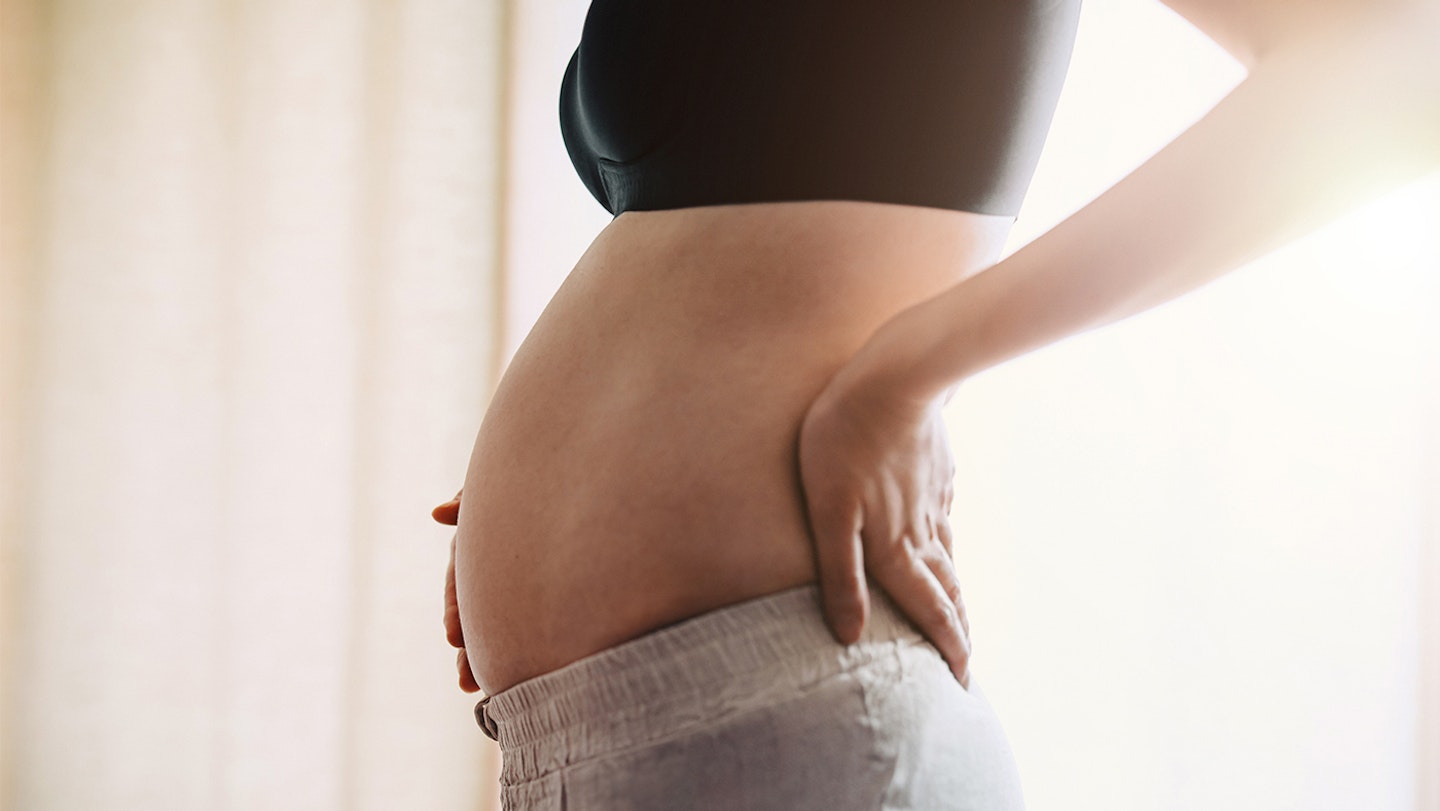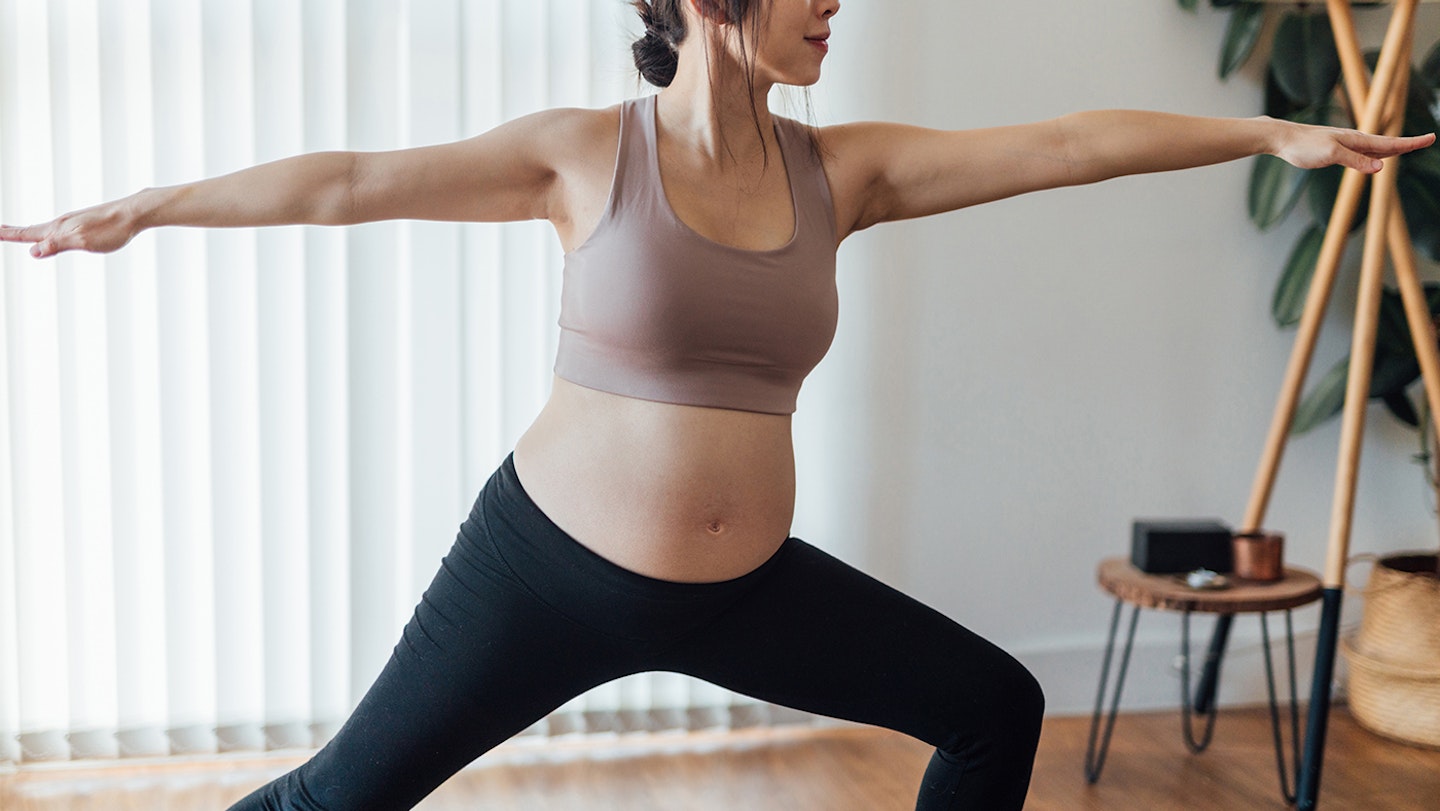
Medically Reviewed by: Rachel Fitz-Desorgher
At nineteen weeks pregnant, you're close to half way through your pregnancy and there's plenty going on with both your body and your baby. Your baby’s lungs are developing, and this week the windpipes will start to form - they'll probably get a lot of use in the early months! You might also start to feel baby moving this week and it's only a week until you've be able to see that movement on your 20 week ultrasound scan. Here are any symptoms you can expect and what your baby and your body are doing at 19 weeks.
How many months is 19 weeks?
At 19 weeks pregnant you're coming into month five of your pregnancy. There's plenty to look forward, especially as you're moving towards week 20 so can expect to have your 20-week ultrasound and can find out the gender of your baby if you want to.
Baby development at 19 weeks pregnant
It's fair to say your baby has been busy for the past 19 weeks!
How big is my baby at 19 weeks pregnant?
Your growing baby is now around six inches long, which is about the size of a mango! They've had a bit of a growth spurt this week and weighs about half a pound now.
What’s my baby doing at 19 weeks pregnant?
Your baby's body - Vernix Caseosa
This week, fat is starting to develop on your baby’s body, although they’ll still look pretty skinny. Baby's body will also be covered in a waxy substance, medically referred to as vernix caseosa. This is greasy and white and made up of hair, oil and dead skin cells. It might not sound too appealing, but it does an important job protecting your baby’s soft and sensitive skin from the amniotic fluid they're living in. In fact, without the vernix, they’d look like they’d been in a bath for nine months! As former midwife Rachel Fitz-Desorgher points out, it can also help the baby come out with a little more ease when they're being born. She also says "It will be absorbed into the skin and is very nourishing which is why you'll probably be advised not to bathe your baby for about a week after birth."
Your baby's skin
At week 19, the pigmentation in your baby’s skin is also beginning to develop, thanks to melanocytes – skin cells that produce the skin pigment melanin – and this will continue after he’s born and well into childhood.
Your baby's movement
By now, your baby is also moving around a lot, so you can expect to start feeling those tiny flutters anywhere between 18 and 22 weeks. That said, every woman and every baby is different, so if you’re not feeling any movement, this isn’t a sign anything is wrong. If you are feeling movements, try to get an idea for the pattern of movements. There's no set number for how often you should feel baby move at 19 weeks, and some women have no movement, but you'll get a feel for your baby's pattern. If you think your baby is moving less than normal, contact your midwife or GP.
Rachel Fitz-Desogher notes that if your placenta has formed at the front of your bump (anterior placenta), you're unlikely to feel as much movement throughout your pregnancy, unless they're kicking at the top or side of the placenta. Nevertheless, Rachel says you should never feel like you're bothering your midwife - if you have an anterior placenta, but you still don't feel them moving as much as normal and you're worried, speak to your midwife.

19 weeks pregnant: Symptoms
Leg Cramps
Leg cramps are one of the 19 weeks symptoms you're likely to experience, and unfortunately you'll feel them more when you’re lying in bed at night - just when you're hoping for a bit of sleep. No one really knows why they choose to interrupt your much-needed sleep, but when those painful leg cramps do strike, try straightening your leg and gently flexing your ankle and toes towards your shins. Harvard Health also suggests standing up or applying a warm washcloth to the leg to loosen the muscle.
Stuffy nose
As we mentioned in previous weeks, those pregnancy hormones can often cause swelling in your nasal passages which makes it hard to breathe. Try unblocking your nose by gently closing one nostril and blowing out of the other. However, Rachel also notes that you can be more prone to nose bleeds in pregnancy so if you're trying to clear your nose, be gentle.
Aches and pains
This can be anything from abdominal aches and pains to hip or groin pain. Round ligament pain, the discomfort in your lower abdomen, has been going on for a few weeks now. It is because of the way your muscles are stretching to make room for your baby. Hip pain might make sleeping at night difficult so try sleeping on your side with a pillow between your knees and another that goes all the way down to your ankles, keeping your legs parallel on top of each other. You could also buy a specially designed pregnancy pillow.
Constipation
This is a normal side effect of pregnancy, given that your organs are being squeezed by your growing baby. But it’s worth taking a look at any pregnancy vitamins or supplements you’re taking as those including iron can often make it worse and Rachel notes that these aren't recommended. Being active - walking or swimming - can also help. It’s also worth talking to your GP or midwife, as they’ll be able to help.
Increased appetite
Constantly hungry? This is a sign your baby is growing, so keep your handbag stocked with healthy snacks! Rachel recommends you avoid sugary snacks and aim for complex carbohydrates at all meals, as these can keep your blood sugar stable and help you feel fuller for longer. You're nourishing their growing body so try to include as many pregnancy super foods as possible. It's likely you'll gain around 1lb a week in the second trimester as your little one grows but you don't need to start eating more until the third trimester when the NHS notes that you'll need around an extra 200 calories a day.
Lightheadedness or dizziness
Lightheadedness can occur because your uterus puts pressure on your blood vessels or because the growth of your baby crowds your chest and lungs meaning you have less oxygen pumping around. Dehydration and hunger are obvious causes so make sure you eat and drink water regularly.
Blurred Vision
Although this sounds super scary, rest assured it is a common and normal side effect, caused by a build-up of fluid in your eyes. Try not to worry too much, but make sure you mention it to your GP or midwife.
Back Pain
Another less desirable 19 week pregnancy symptom is back pain, particularly in the lower back. Your uterus is growing and putting extra pressure on your lower back. If you are suffering with back pain, make sure you take it easy - speak to your midwife or a pregnancy physiotherapist about the type of exercise you ought to do, and try not to lift anything too heavy. If you do have to lift, remember to bend your knees and lift slowly with your arms, not your back. A pregnancy support belt can also help.
Skin changes
The extra pregnancy hormones may be causing changes to your skin - pigment patches known as Melasma and chloasma could appear on your body and face and your nipples may become darker. Rachel notes that it's increasingly important now to wear sunscreen as you're more sensitive to it.
You could also start to see the dark line known as 'Linea Nigra' which Midwife, Lesley Gilchrist notes is "caused by the increased oestrogen levels experienced in pregnancy, which boost the body’s production of melanin, a natural substance that gives your skin pigment." It's this Melanin that's responsible for Melasma and darker nipples, but as Lesley says "it is a common occurrence in pregnancy and won’t cause any harm to you or your baby."
Your body at 19 weeks pregnant
Your bump at 19 weeks pregnant
At 19 weeks pregnant, you'll certainly be showing and you might have stated to feel some little flutters of baby's kicks. These can generally be felt between around 18 weeks to 22 weeks. But don't worry if you haven't felt baby's movement at 19 weeks pregnant - every body is different. As we've mentioned above, your baby bump is stretching and growing at 19 weeks so you can expect some aches and pains as the ligaments stretch.
Your breasts
Your body is already making milk - colostrum - from around 16 weeks and Rachel notes that you may leak it in tiny amounts. If you do, or even if you don't, there's nothing to worry about. You may also notice Montgomery glands which are there to soothe and protect your nipples naturally.

Looking after yourself at 19 weeks pregnant
While you're almost half way through your pregnancy, there's still a way to go so it's good to get into the habit of looking after yourself. There are a number of ways you can help both your body and mind.
Prenatal Yoga
Finding a good prenatal yoga class has many benefits. Not only will it keep you limber and relaxed, it can be a great chance to meet other soon-to-be mums and create your mum friendship circle for when baby arrives.
Take care of your joints
While it's more common on the third trimester, Carpal Tunnel syndrome can affect your joints at any time so if you work with a computer, try not to place too much pressure on your wrists - perhaps buy an ergonomic keyboard to help avoid it in later pregnancy.
Pamper yourself
Because why not! Book in for a pedicure while you can still see your feet or treat yourself to a pregnancy massage to soothe any aches and pains. Now's the time to put yourself and the baby you're growing first.
About the experts
Rachel Fitz-D is an active birth teacher, parenting consultant and author of Baby Skin To Skin, with over 30 years working as a midwife and as a parenting consultant. Based in Berkshire, near London, she has appeared on numerous radio programmes, talking about various issues from infant feeding to smacking to humanist parenting. She co-created Henley Birthcare, a unique freelance midwifery and doula service offering bespoke care.
Lesley Gilchrist, BSc (Hons) Midwifery Studies, MSc Clinical Research Methods, is the CEO and founder of 'My Expert Midwife' and has been a midwife since 2003, working in some of the largest teaching hospitals in Europe. Through this time, Lesley has gained invaluable experience and insight into maternity care, labour and birth.
Maria Martin is Digital Group Editor for Yours.co.uk and Motherandbaby.com. She is a mum-of-two with a passion for helping women from all walks of life – from supporting breastfeeding mothers with expert advice to encouraging conversations about mental health. In her professional role, she has over 10 years' experience in the digital world, including editing articles, focussing on SEO, social media engagement, picture researching and video editing.
